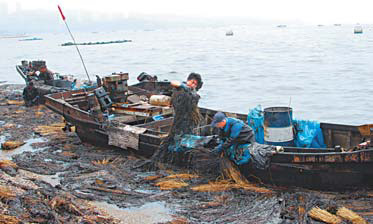 |
Large Medium Small |
DALIAN - Early morning on July 17, China Daily Dalian bureau chief Zhu Chengpei and I arrived at Dalian's Xingang port, where two crude oil pipelines had exploded and triggered a fire the night before.
|
 Fishermen use straw mats to absorb oil near the shore in Dalian, Liaoning province. Li Jing / China Daily |
A long queue of trucks carrying sand and stones blocked our way at an intersection about eight kilometers away from the site.
Zhu rolled down the window of our car. A pungent odor greeted us. I made two plugs with facial tissue for my nose and went out to photograph the traffic. The sky was gray. A little knot of defenseless spectators was standing on the footpath, whispering about the snorting vehicles and the accident in the port.
The traffic moved slowly after we crossed the intersection. Zhu drew my attention to a traffic policeman. He looked as if he had just crawled out of a coal mine.
Approaching the oil terminal, we found more and more policemen and vehicles with "black coats".
The short trip to the oil terminal took us about an hour. We parked our car in a vacant space in a residential area. On the other side of the road was the gate of Dalian PetroChina International Warehousing and Transportation Co Ltd.
Flames and heavy smoke were still rising about 300 meters away from where we were standing. Fire-fighting trucks queued along the road, with their drivers awaiting further instructions. Some firefighters were taking naps after a night-long campaign against the fire.
Nobody except for some medical personnel was wearing masks or nose plugs.
I began to realize how finicky I was, compared to those who had been here a while. Within only a few minutes, I had plugged my nose with facial tissue. Feeling a bit embarrassed when comparing myself to those who had withstood these conditions all night long, I took the tissue balls out of my nose.
Lu Jie, 21, was sitting on the back of a fire-fighting truck. Another firefighter was sitting beside him, sleeping.
Lu told me both of them were working to shut off the valves of the oil tankers during the night. It took three firefighters six hours to shut off three valves.
I wanted to know more about his work, but seeing his eyelids struggle against sleep, I could not find it in my heart to ask him more questions.
We went ahead. Several firefighters were standing beside their trucks. They were eating biscuits and sausage.
They gladly accepted our request to climb onto their truck and take pictures of the No 3 oil tanker, which was still discharging smoke at that time.
Talking about the fire of last night, they were proud that they had put the situation under control. A firefighter described it as a scene from a "Hollywood movie".
When we walked to the front of the No 3 tanker, I understood what he meant.
The tanker, with a capacity of 100,000 cubic meters of crude oil, was heavily damaged. At the top of it, a part of the wall was cracked open. The pipelines beside it were transformed by the fire. Portions of the pipeline wall were almost burned to ash.
After the accident, firefighters, fishermen, environmental-protection volunteers, and citizens from all walks of life joined the campaign against the oil spill.
More than 1,000 fishermen joined the effort, using anything possible to collect oil.
When I was interviewing fisherwoman Li Juan on July 24, she suggested that I not get into her boat, which was full of oil.
"I'm afraid you'll have to throw your clothes and shoes away, if you happen to slip on board," she said.
But I finally persuaded her and her husband to take me out. Seven days had passed since the July 16 accident. Almost no thick oil was left on the sea. We did not see anybody else in the first 20 minutes.
When four fishermen and two boats came into view, I was excited. I wanted so much to take photographs of people collecting oil on the sea.
They were working along the bank of a dock. Seeing us approaching, they said hello to the young couple. They are neighbors.
At that time, I was so busy taking pictures that I did not notice many details.
In the evening, when I came back to the office and started to process the photos, I felt deeply moved by the four fishermen.
In one photograph, a man was stretching out his bare hand for the trash.
In another one, a man was collecting oil with a spade; the other man was just standing, elbows bent. Judging from his hands and arms, which were covered with black oil, I knew he was scooping oil with his bare hands too.
I had never thought that people could be so happy while doing such dirty jobs. Their simple smiles gave me a shock and made me feel very humble.
Later that day, Li Juan and her husband had voluntarily dropped me off at a harbor in Dagushan for my convenience. They had to sail for nearly an hour to get back home. When I got off their boat, I tried to give Li 100 yuan. But she refused.
"We're doing this not just for money," said the young woman.
During the past two weeks, I have been covering the cleanup efforts. The positive local residents are still enjoying their delicious seafood. Tourists still flock to this summer resort. And thanks to the prompt action supported by all the citizens, the sea near Dalian is on its way to becoming clear again.
China Daily